6 Best Gentle Workouts to Sculpt a Stronger Body as You Age
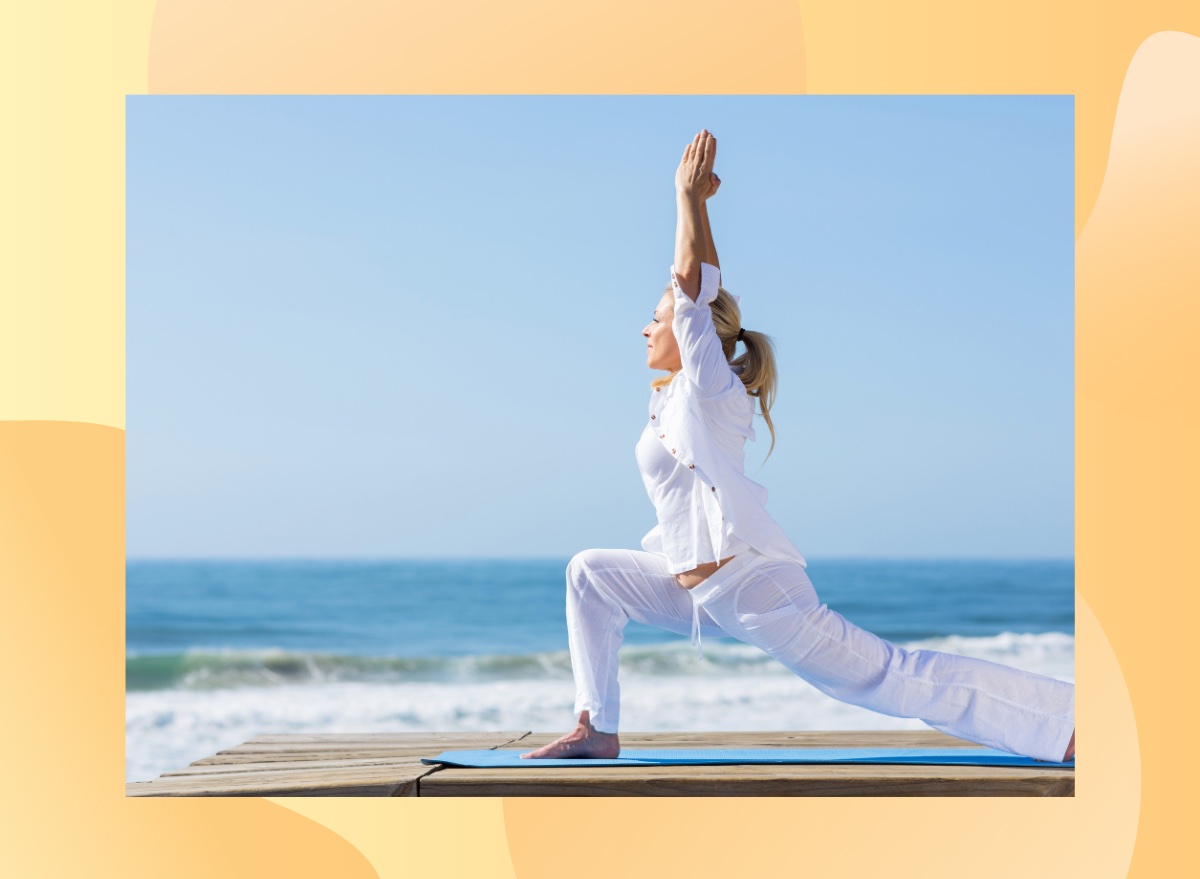
As you age, staying active and maintaining a strong, healthy body becomes crucial. However, the key is finding workouts that are gentle on the joints while effectively building strength and boosting overall fitness. Whether you want to improve flexibility, build muscle, or stay active, incorporating gentle workouts into your routine can make a significant difference.
In this article, I'll explore six of the best gentle workouts to build strength as you age. From the calming stretches of yoga flows to the refreshing resistance of water aerobics, these exercises offer a variety of ways to keep your body moving and your muscles strong. Read on to discover detailed descriptions, step-by-step instructions, and each workout's benefits, helping you choose the best options for your fitness journey.
Workout #1: Yoga Flows
Yoga flows are wonderfully gentle workouts that enhance flexibility, build strength, and reduce stress. They provide a low-impact, joint-friendly workout that can be tailored to any fitness level. Yoga flows improve balance and coordination while promoting relaxation and mental clarity. Plus, they require minimal space and no equipment, making them highly accessible and convenient.
1. Downward Dog
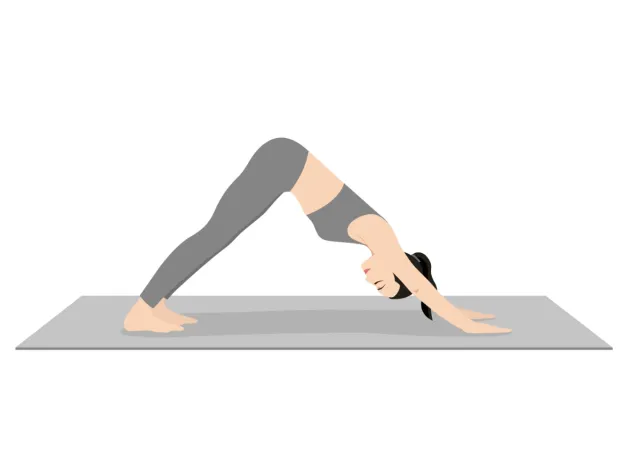
Downward dog is a foundational yoga pose that stretches the entire body, particularly the hamstrings, calves, and shoulders. It also strengthens the arms and legs while improving circulation and promoting relaxation.
To do the downward dog, start on your hands and knees with your wrists below your shoulders and your knees under your hips. Spread your fingers wide and press firmly into your hands as you tuck your toes and lift your hips toward the ceiling. Straighten your legs as much as possible, forming an inverted "V" shape with your body. Keep your head between your arms and your heels reaching toward the ground.
Perform three to five rounds, holding this position for 30 seconds to a minute, focusing on deep, steady breaths. Rest for 60 to 90 seconds between rounds.
2. Bridge Pose
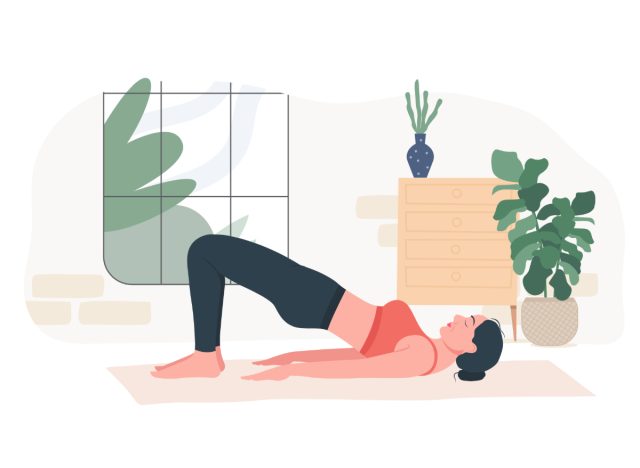
Bridge pose is excellent for strengthening the back, glutes, and hamstrings. It also opens up the chest and shoulders, which can improve posture and alleviate tension in the upper body.
To perform this exercise, lie on your back with your knees bent and your feet flat on the floor, hip-width apart. Place your arms by your sides with your palms facing down. Press into your feet and lift your hips toward the ceiling, squeezing your glutes and engaging your core.
Complete three to five rounds, holding the bridge pose for 15 to 30 seconds, focusing on a strong squeeze of the core and glutes and a slow lowering back to the starting position. Rest for 60 to 90 seconds between sets.
3. Crescent Lunge
The crescent lunge is a dynamic yoga pose that strengthens the legs and glutes while stretching the hip flexors and improving balance. It's great for building lower-body strength and enhancing overall stability.
To do the crescent Lunge, start in a standing position. Step one foot back and bend your front knee to a 90-degree angle, ensuring your knee is directly above your ankle. Keep your back leg straight and your heel lifted. Raise your arms overhead, reaching toward the ceiling.
Perform three to five rounds of the crescent lunge, holding this position for 30 seconds to a minute, then switch sides. Focus on maintaining a strong, stable stance and deep, controlled breathing. Rest for 60 to 90 seconds between sets.
Workout #2: Bodyweight Strength
Bodyweight workouts are exceptional for providing low-impact, joint-friendly options that effectively build strength, endurance, balance, and coordination. They're also great for enhancing weight-loss efforts if that's your goal.
One of the best aspects of bodyweight workouts is their versatility. You don't need equipment—just your body and gravity—and they can be done in any space that allows movement. This makes them incredibly convenient and adaptable to any fitness level or environment.
1. Wall Sits
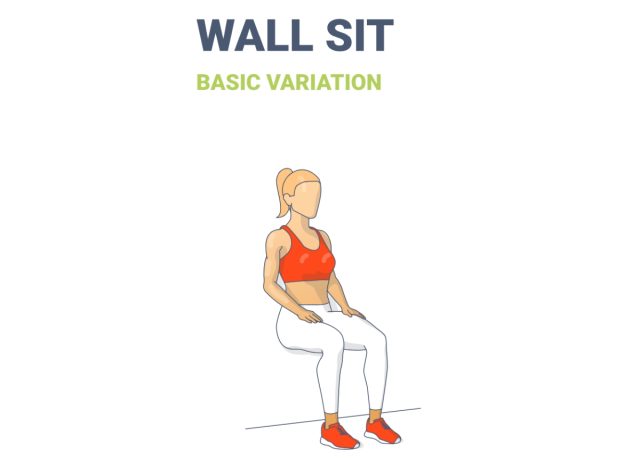
Wall sits are an excellent way to build strength and endurance in your lower body. They target your quads, hamstrings, and glutes, providing a solid workout without needing any equipment. Plus, they're great for improving muscular endurance and stability, especially around the knee joints, making them perfect for anyone looking to enhance their leg strength in a gentle, controlled manner.
Stand with your back against a wall and your feet shoulder-width apart. Slowly slide your back down the wall until your thighs parallel the ground as if you're sitting in an invisible chair. Ensure your knees are directly above your ankles and your back remains flat against the wall. Hold this position for 30 seconds to a minute, then slowly slide back up to standing.
Perform three to four sets of 15 to 30-second holds. Rest for 60 seconds between sets.
2. Pushups
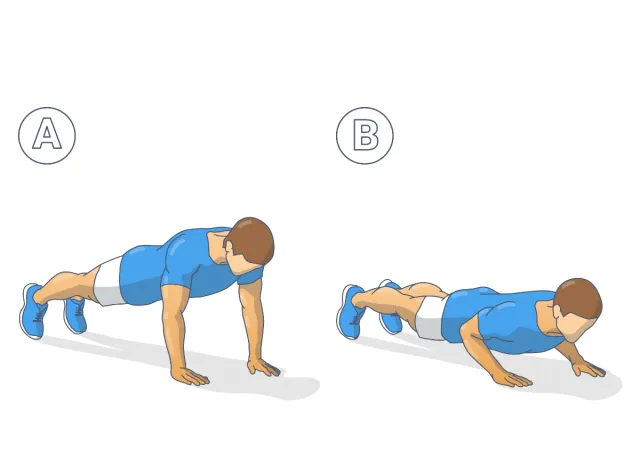
The pushup is a fantastic bodyweight exercise that strengthens your chest, shoulders, triceps, and core. It's incredibly effective for building upper-body strength and improving overall fitness. Plus, it can be modified to suit any fitness level.
To perform a pushup, start in a high plank position with your hands placed slightly wider than shoulder-width apart. Keep your body in a straight line from your head to your heels. Lower your body by bending your elbows, keeping them close to your sides, until your chest nearly touches the ground. Push back up to the starting position, fully extending your arms. If needed, you can modify it by doing pushups on your knees or with an incline on a bench.
Complete three to four sets of 6 to 12 reps. Rest for 60 to 90 seconds between sets.
3. Reverse Crunch
Reverse crunches are excellent for targeting your lower abs and improving core strength. This exercise is gentle on your lower back while effectively working your abdominal muscles, making it a great option for those seeking to enhance their core stability and strength.
To do reverse crunches, lie on your back with your hands by your sides and your legs lifted so your thighs are perpendicular to the ground and your knees are bent at a 90-degree angle. Engage your core and lift your hips off the ground, bringing your knees toward your chest. Slowly lower your hips back to the starting position, keeping your movements controlled and your lower back pressed into the floor. Repeat for the desired number of repetitions.
Perform three sets of five to eight reps, emphasizing a three to five-second lowering with each rep. Rest for 60 seconds between sets.
Workout #3: Resistance Band Training
Resistance band workouts are fantastic for providing a low-impact, joint-friendly way to build strength, improve endurance, and enhance coordination. They are incredibly versatile and portable, making them perfect for home workouts or on-the-go training. With resistance bands, you can easily adjust the intensity by changing the band's tension or your grip, allowing for a customized workout experience that fits any fitness level.
1. Bent-over Row
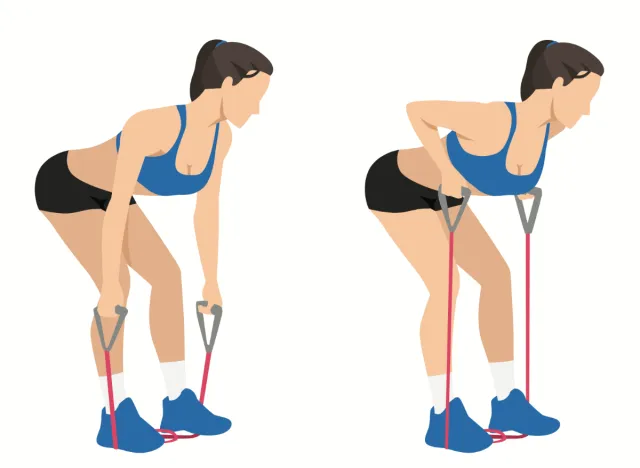
Bent-over rows with a resistance band are excellent for strengthening your back muscles, including the lats, rhomboids, and rear deltoids. This exercise helps improve posture and upper-body strength, which are crucial for daily activities and overall fitness.
Stand in the middle of a resistance band with your feet shoulder-width apart to do a bent-over row. Hold the ends of the band with your palms facing each other. Bend at your hips and knees, keeping your back straight, to lean your torso forward. Pull the band toward your hips, squeezing your shoulder blades together at the movement's top. Slowly return to the starting position and repeat.
Complete three sets of eight to 15 reps. Rest for 90 seconds between sets.
2. Band Pull-aparts
Band pull-aparts are a simple yet effective exercise for strengthening the upper back and shoulder muscles. They help improve posture and shoulder stability, making them a great addition to any workout routine.
To perform a band pull-apart, hold a resistance band with both hands at shoulder height and your arms extended in front of you. Keep your arms straight and pull the band apart by squeezing your shoulder blades together until your arms are fully extended to the sides. Slowly return to the starting position and repeat.
Perform three to four sets of 12 to 15 reps. Rest for 60 to 90 seconds between sets.
3. Pallof Press
The Pallof press is an excellent exercise for enhancing core stability and strength. It targets the deep core muscles and improves your ability to resist rotational forces, which is important for overall functional strength and injury prevention.
To do a Pallof press, anchor a resistance band at chest height and stand perpendicular to it. Hold the band with both hands close to your chest and step away from the anchor point to create tension. With your feet shoulder-width apart and knees slightly bent, press the band straight out before you, keeping your core engaged and resisting the band's pull. Hold for a moment, then slowly return to the starting position. Repeat on both sides.
Complete three to four sets of 10 to 15 reps per side. Focus on holding each press for a strong, two to three seconds. Rest for 60 seconds between sets.
Workout #4: Water Aerobics
When thinking of the best gentle workouts to add to your routine, don't sleep on water aerobics. This form of exercise is fantastic for providing a low-impact, joint-friendly workout session that effectively builds strength, endurance, and flexibility. It is particularly beneficial for those with joint issues or seeking a gentle yet effective exercise option.
One of the best aspects of water aerobics is the resistance provided by the water, which enhances your workout without putting undue stress on your body. Plus, it's fun to stay active and cool, especially during hot weather.
1. Aqua Jogging
Aqua jogging is an excellent cardiovascular exercise that mimics the motion of running without the impact. It strengthens your legs, improves cardiovascular endurance, and enhances overall fitness. The resistance of the water makes your muscles work harder, providing a great workout while being gentle on your joints.
To do aqua jogging, start in the pool's shallow end, where you can stand comfortably. Begin jogging in place, lifting your knees high, and pumping your arms. As you get more comfortable, move to the deeper end of the pool, where you can't touch the bottom.
Continue jogging, focusing on maintaining an upright posture and a steady pace. Aim for 15 to 20 minutes of continuous jogging.
2. Water Pushups
Water pushups are a fantastic upper-body exercise that targets your chest, shoulders, and triceps. The buoyancy of the water reduces the strain on your joints while providing resistance to help build strength. This makes them perfect for those looking for an effective, joint-friendly workout.
To perform water pushups, stand facing the pool wall with your hands placed shoulder-width apart on the pool's edge. Lean forward and lower your chest toward the wall, bending your elbows out to the sides. Push back up to the starting position, straightening your arms. Repeat this movement for the desired number of repetitions.
Complete three to four sets of 10 to 15 reps. Rest for 60 to 90 seconds between sets.
3. Leg Lifts
Leg lifts in the water are excellent for strengthening your core, hip flexors, and lower body. The water's resistance adds an extra challenge to the exercise while remaining gentle on your joints, making it ideal for improving core stability and leg strength.
Stand in the pool with your back against the pool wall for support. Extend your legs out in front of you, keeping them straight. Slowly lift one leg to the water's surface, then lower it back down. Repeat with the other leg. For an added challenge, try lifting both legs simultaneously.
Perform three sets of 12 to 15 reps for each leg. Rest for 60 seconds between sets.
Workout #5: Walking
Walking workouts are among the most accessible and versatile gentle workouts you can incorporate into your fitness plan. They are excellent for enhancing weight loss, boosting mental health, and being gentler on your joints compared to jogging or sprinting. You can perform walking workouts once or twice daily and multiple times throughout the week, making them an easy and effective way to stay active regularly.
1. Steady-state Walking
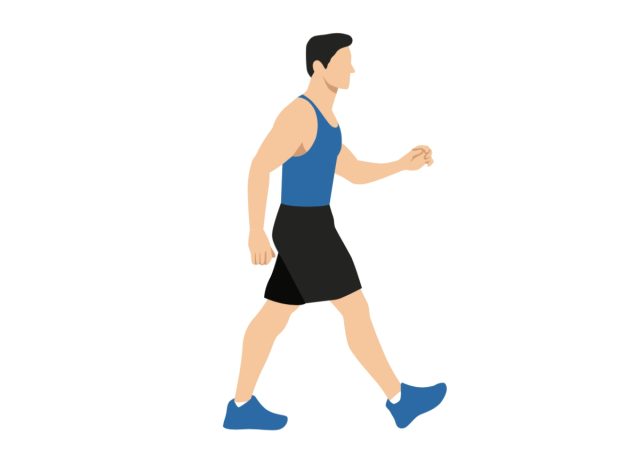
Steady-state workouts are an excellent way to incorporate regular movement into your week, burn calories, and protect your joints with low-impact exercise. They're simple yet highly effective!
Start by walking at a brisk pace for 20 to 30 minutes. The key is gradually increasing your weekly walking time and building your endurance at a comfortable and safe pace. For added resistance, consider wearing a weighted vest or carrying light dumbbells. Weighting your walks enhances the workout's intensity while keeping it gentle on your joints.
2. Incline Walking
Incline walking involves raising the incline on a treadmill or finding a favorite hill in town to climb. This type of workout remains gentle on your body while naturally increasing intensity, maximizing its strength and weight-loss benefits.
You can perform incline walking as a steady-state workout by walking continuously for 20 to 30 minutes. Alternatively, try interval training if you have a smaller hill or want to vary your treadmill routine. Move at a brisk pace for 60 seconds, then recover at a slower pace for 30 to 60 seconds. This combination keeps your workouts effective and engaging.
3. Walking Intervals
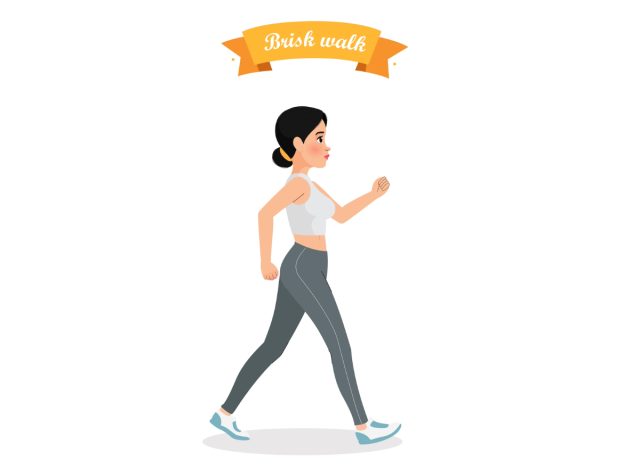
Walking intervals offer numerous benefits for a joint-friendly, gentle weight-loss workout. Alternating between brisk and slower walking boosts cardiovascular health and calorie burn while being easy on the joints. This approach enhances endurance, supports weight loss, and reduces workout monotony, making it ideal for consistent, enjoyable exercise.
Walk briskly for two minutes, followed by a slower recovery pace for one minute. Repeat this cycle for 20 to 30 minutes. Finish with a five-minute cool-down walk at a relaxed pace.
Workout #6: Core Strength and Stability
Core workouts skip the high-impact nature of other exercise options while helping to improve strength, muscular endurance, balance, and coordination.
1. Plank with Shoulder Taps
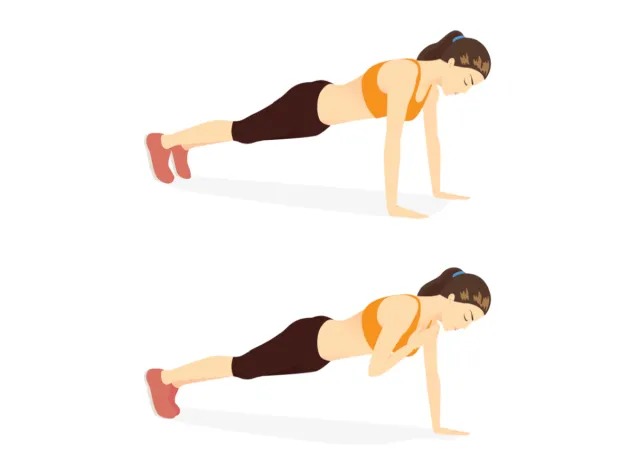
Planks with shoulder taps offer a gentle yet highly effective way to train your core. This exercise strengthens your abs and enhances stability in your midsection and shoulders. The shoulder tap motion further engages your core muscles, improving anti-rotational strength and overall balance. The added challenge of resisting rotation helps build a more resilient and stable core, which is crucial for maintaining proper posture and preventing injuries during various physical activities.
Start in a standard plank position with your body in a straight line from your head to your heels, supported by your toes and forearms. Engage your core to maintain stability and ensure your hips remain level. Transition to a high plank by straightening your arms and keeping your hands under your shoulders. From this position, lift your right hand and tap your left shoulder, then return your hand to the starting position. Repeat this movement with your left hand, tapping your right shoulder.
Perform three sets of 10 to 15 taps per side. Rest for 60 seconds between sets.
2. Dead Bugs
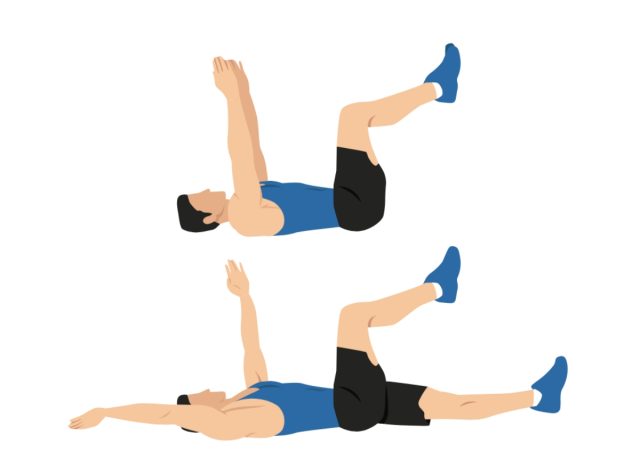
The dead bug is a fantastic, gentle exercise that really strengthens your core muscles, including your abs, lower back, and hips, without putting too much stress on your spine or joints. This makes them perfect for anyone dealing with back pain or recovering from injuries.
Dead bugs are great for improving coordination and stability since they get both sides of your body working together in a controlled way. They also help reinforce proper movement patterns and boost overall functional strength, which leads to better posture and a lower risk of injury during daily activities.
Start by lying on your back with your arms extended straight up toward the ceiling and your knees bent at a 90-degree angle directly above your hips. Engage your core by pressing your lower back into the floor. Begin the movement by slowly lowering your right arm and left leg toward the ground simultaneously, keeping your back flat and your movements controlled. Bring them back to the starting position and lower your left arm and right leg similarly. Continue alternating sides for the desired number of repetitions, maintaining a steady pace and ensuring your lower back remains in contact with the floor throughout the exercise.
Complete three sets of four to eight reps per side. Rest for 60 seconds between sets.
3. Side Plank + Thread the Needle
Side Planks, paired with the thread-the-needle motion, target your obliques and help improve core stability, which is essential for overall strength and balance. The twisting motion also enhances shoulder mobility, adding extra flexibility to your workout. Plus, holding a side plank is fantastic for building endurance in your core and lower back without putting too much strain on your joints.
Start by lying on your side with your legs extended and stacked on top of each other. Prop yourself up on your bottom elbow, position it directly under your shoulder, and lift your hips off the ground to form a straight line from head to foot. Extend your top arm straight up toward the ceiling.
Begin the thread-the-needle motion by bringing your top arm down and under your torso, reaching as far as possible while twisting your upper body. Return your arm to the starting position, extending it toward the ceiling. Repeat this motion for the desired number of repetitions, then switch sides.
Perform three sets of five to 10 reps per side, emphasizing control and a full twist. Rest for 60 seconds between sets.









